Understanding the Role of Family Support in BPD
Borderline Personality Disorder (BPD) presents significant challenges, not only for those who are diagnosed but also for their families. The disorder is often characterized by emotional instability, intense interpersonal relationships, and fears of abandonment. Recognizing and utilizing the supportive role of families can profoundly impact the management and treatment outcomes for individuals with BPD.
The Impact of Family Dynamics on BPD
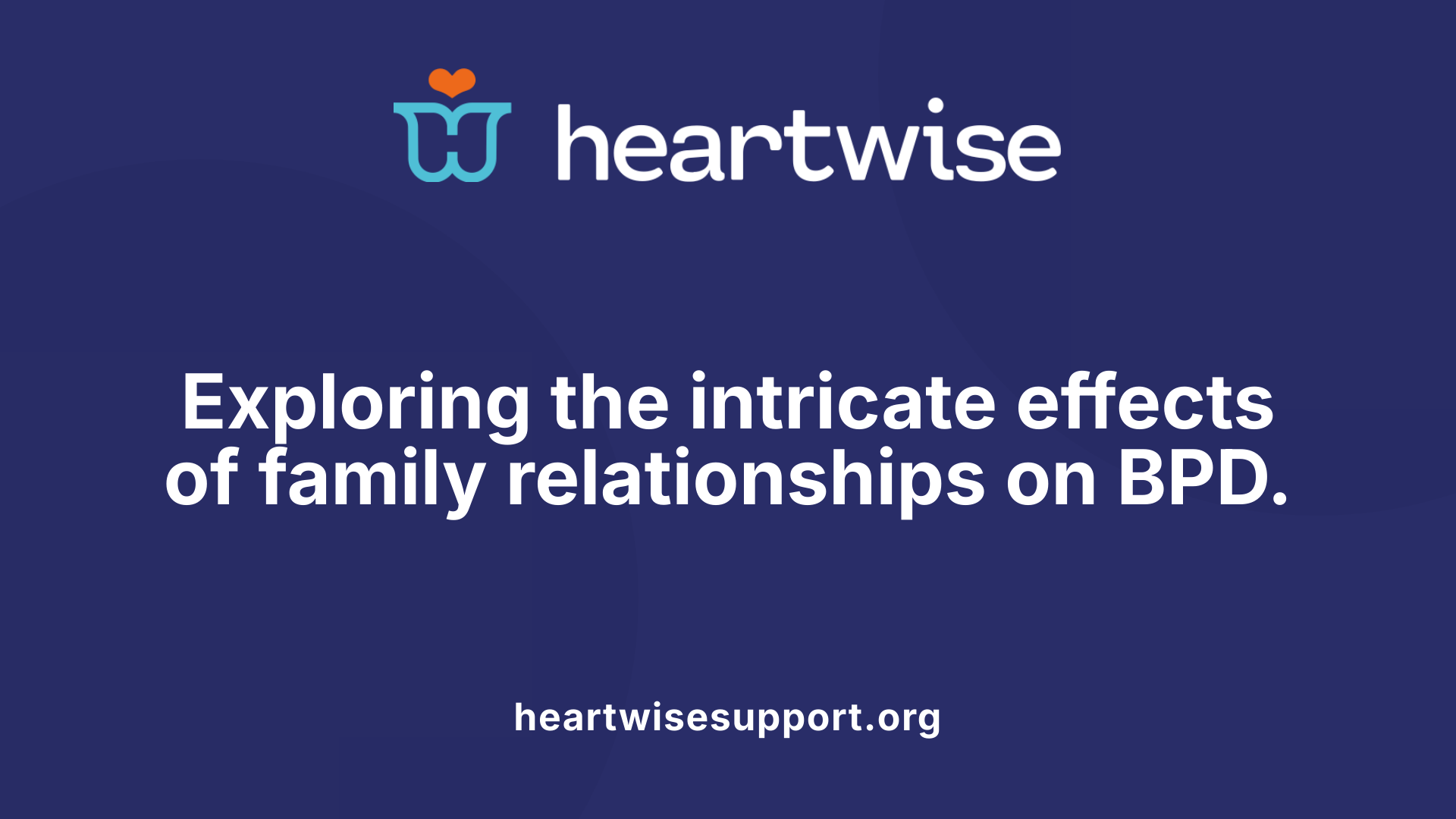
What is the impact of family dynamics on borderline personality disorder (BPD)?
The impact of family dynamics on borderline personality disorder (BPD) is profound and multifaceted. Families of individuals with BPD often experience increased levels of psychopathology, conflict, and dysfunctional relational patterns, which can further strain their mental health.
Parents may struggle with feelings of inadequacy and exhaustion due to the challenges of managing BPD behaviors. This can lead to chaotic home environments characterized by inconsistent parenting and emotional instability.
Conflict and relational patterns
Siblings of those with BPD sometimes take on caregiving roles, which may create additional emotional strain within the family. This dynamic not only shifts the responsibilities among family members but can also lead to resentment and burnout among siblings.
Dysfunctional communication often manifests as heightened conflict where even small misunderstandings can escalate quickly, resulting in emotional distress for all parties involved.
Parental roles and challenges
The challenges faced by parents can include coping with intense emotional outbursts and impulsive behaviors exhibited by their loved one. Parents may inadvertently contribute to the disorder's persistence through maladaptive responses, which can create a cycle of instability. This is where effective therapeutic interventions that involve the entire family can be beneficial—helping to address these dynamics, promote healthier communication, and ultimately improve relationships.
| Topic | Description | Impact on Family Dynamics |
|---|---|---|
| Family Psychopathology | Increased stress and mental health issues among family members | Heightened emotional strain, exhaustion and confusion |
| Conflict and Relational Patterns | Frequent misunderstandings and emotional outbursts | Reduced stability and increased chaos at home |
| Parental Roles and Challenges | Caregiving roles and emotional responsibilities | Feelings of overwhelm and inadequacy among parents |
Effective Strategies for Family Support
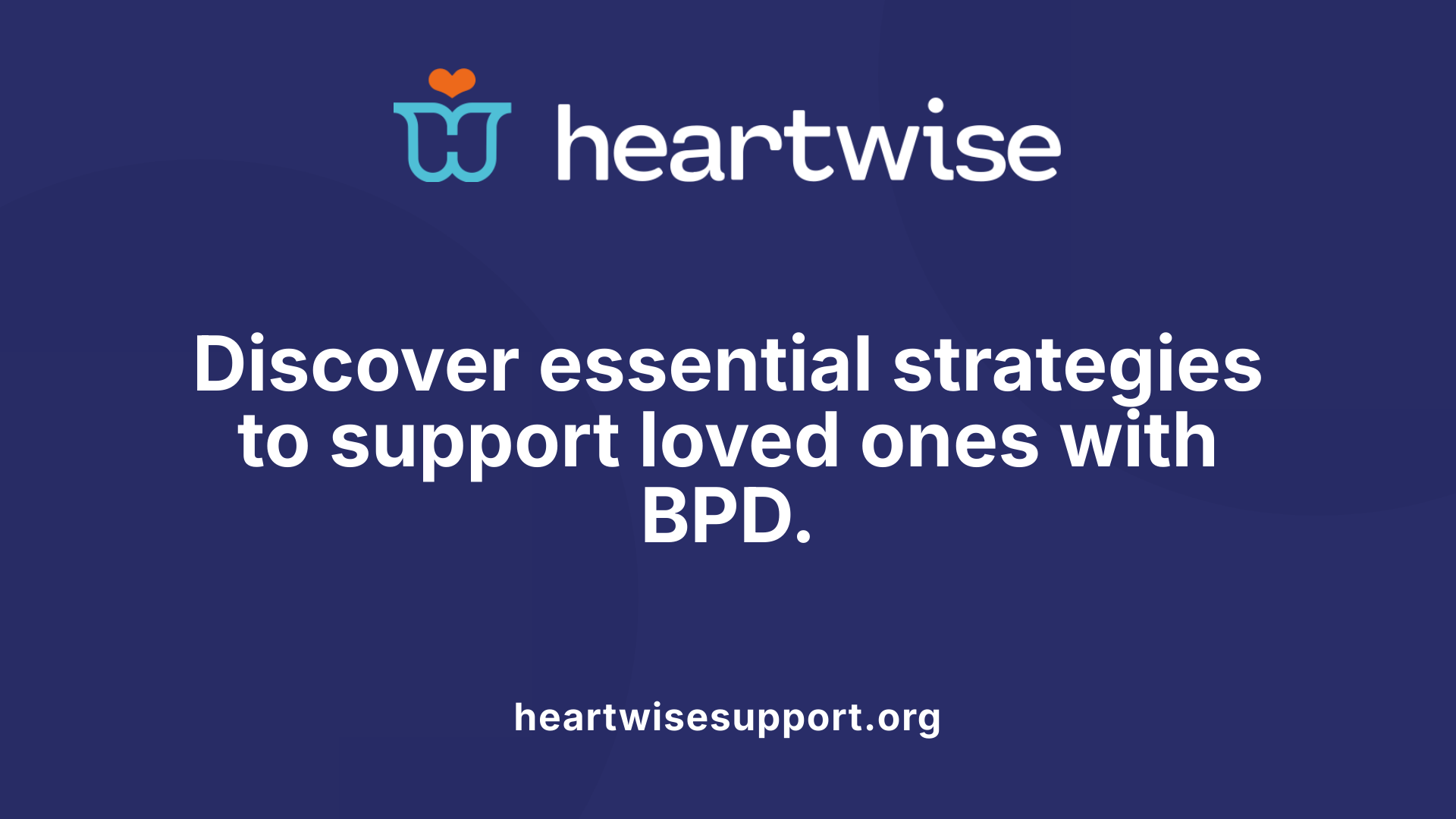
What are effective strategies for families to support their loved ones with BPD?
One crucial strategy involves educating oneself about Borderline Personality Disorder (BPD) and the principles of Dialectical Behavior Therapy (DBT). This knowledge helps family members enhance empathy, improve communication, and better understand the experiences of their loved ones. Improved comprehension fosters better family dynamics and allows relatives to respond compassionately during emotional episodes.
Why is it important to establish boundaries?
Setting clear and consistent boundaries is vital for individuals with BPD, fostering a sense of security. Boundaries must emphasize values behind them, ensuring that all family members understand the purpose. Family members should also prioritize their mental and physical health to avoid burnout while supporting their loved ones. A clear understanding of personal well-being can keep the environment from becoming chaotic.
How does emotional validation enhance support?
Healthy communication significantly impacts relationships involving individuals with BPD. Family members should focus on validating emotions rather than merely discussing words. This practice helps individuals feel heard and accepted, reducing feelings of guilt or shame about their emotional states. Seeking professional help, particularly from a therapist trained in DBT, can be immensely beneficial for both the individual with BPD and their family, providing structured support to face the disorder's challenges together.
| Strategy | Description | Benefit |
|---|---|---|
| Education on BPD/DBT | Learn about BPD and DBT techniques to enhance understanding and empathy. | Improved family dynamics and emotional support. |
| Establishing Boundaries | Set clear limits while communicating the reasons behind them to ensure safety and understanding. | Creates a secure environment for recovery. |
| Emotional Validation | Focus on validating feelings through compassionate communication rather than solely evaluating words. | Reduces guilt and promotes acceptance. |
Coping with the Challenges: Strategies for Family Members
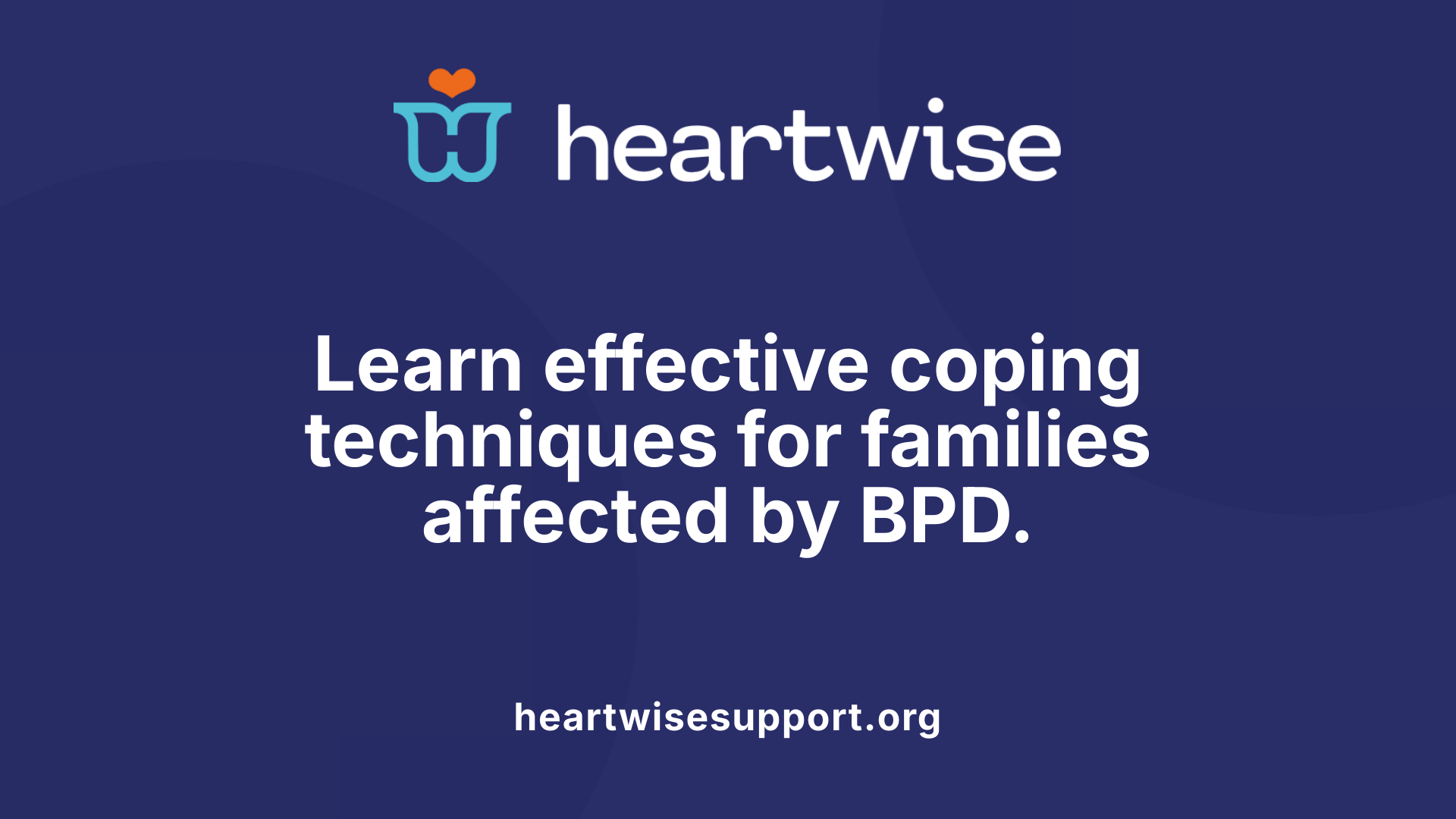
What coping strategies are available for family members of individuals with BPD?
Family members navigating the complexities of Borderline Personality Disorder (BPD) can adopt several effective coping strategies. Patience and non-judgment are foundational virtues, fostering an environment where loved ones with BPD feel safe to express their emotions without fear of ridicule.
Setting clear boundaries remains a critical aspect of support. Establishing mutual expectations not only builds trust but also provides a sense of stability for individuals struggling with BPD, who often grapple with feelings of insecurity.
Planning ahead for challenging moments can also be tremendously beneficial. Discussing potential triggers or crises during calmer times ensures family members are prepared when emotions run high, which helps mitigate chaotic situations.
Importance of self-care
Family members must not overlook their own mental health. Supporting an individual with BPD can be emotionally taxing; hence, prioritizing self-care activities—such as pursuing hobbies or seeking therapy themselves—can bolster their resilience.
Educating about BPD triggers
Education is another powerful tool. Understanding BPD and its specific triggers enhances empathy and reduces frustration. Being informed empowers family members to navigate conversations more effectively and aids in preventing misunderstandings that may lead to conflict.
Genetic Factors in BPD Development
Is there a genetic component in developing borderline personality disorder?
Studies indicate that there is indeed a genetic component involved in the development of Borderline Personality Disorder (BPD). Research has found that BPD tends to run in families, suggesting a hereditary link. First-degree relatives of individuals diagnosed with BPD, such as parents or siblings, are at a heightened risk of developing the disorder themselves.
Heritability of BPD
The heritability of BPD has been estimated to be around 30 to 40%. This means that genetics plays a significant role alongside environmental factors, such as childhood trauma or maladaptive parenting, in contributing to the likelihood of an individual developing BPD. Therefore, understanding genetic predispositions is vital in comprehensively addressing the disorder's impact within families.
Role of family genetics
Family genetics can influence individual behaviors and emotional responses. Growing up in an environment where BPD traits manifest can further stoke emotional instability, potentially establishing a cycle of dysfunction. Family support becomes essential not only in treatment but also in breaking down these genetic patterns by fostering healthier environments.
The Significance of Emotional Support Systems
How can emotional support systems impact the management of BPD?
Emotional support systems play a crucial role in managing borderline personality disorder (BPD) by providing essential emotional and practical assistance. Family members and close friends contribute significantly to the individuals with BPD, helping them feel understood and less isolated. This emotional connection is vital for their overall mental well-being.
Supportive relationships can act as a buffer against the emotional turbulence that comes with BPD. For instance, therapeutic approaches like Dialectical Behavior Therapy (DBT) and Cognitive Behavioral Therapy (CBT) can be enhanced through strong emotional backing, which often leads to improved therapy outcomes. When family and friends engage positively, it fosters an environment conducive to recovery, offering individuals a safe space to express their feelings.
Additionally, educational resources and participation in peer support groups empower both individuals with BPD and their families to navigate the challenges of the disorder effectively. By increasing understanding, these resources encourage open dialogue, which is critical in building trust and empathy within relationships.
Ultimately, a robust support system contributes to better emotional regulation, accountability, and effective crisis management. This holistic approach significantly elevates the quality of life for those affected by BPD, emphasizing the importance of both therapeutic and emotional support in the journey toward healing.
Family Involvement in the Therapeutic Process
How can family involvement influence the therapeutic process for individuals with BPD?
Family involvement can significantly influence the therapeutic process for individuals with Borderline Personality Disorder (BPD) by providing essential support and enhancing treatment outcomes. Research consistently indicates that including families in therapy leads to improved communication within the family system, establishing healthy boundaries, and reducing caregiver burden. This familial support can decrease self-harm and suicidal ideation, while also fostering better emotion regulation skills among those affected by BPD.
Family therapy benefits
Family therapy serves as an effective component of treatment, focusing on improving family dynamics and understanding. When family members participate in therapy, they learn essential skills to manage their reactions and support their loved one effectively. This involvement not only benefits individuals with BPD but also helps families cope with the emotional toll of the disorder.
Programs for families
Programs like Family Connections™ offer valuable education and support to families, providing them with the tools needed to navigate the complexities of BPD. Participants learn communication strategies, emotional validation techniques, and how to set healthy boundaries—all crucial for fostering a stable and supportive environment. By empowering family members to address their mental health needs, these programs enhance the overall well-being of both the individual with BPD and their support system.
| Aspect | Family Involvement | Outcomes |
|---|---|---|
| Communication Improvement | Enhanced dialogue | Reduction in conflicts |
| Emotional Support | Increased validation | Lowered feelings of isolation |
| Goal Setting | Realistic expectations | Greater adherence to treatment |
| Education | Understanding BPD | Better coping strategies |
Educational Resources for Families Managing BPD
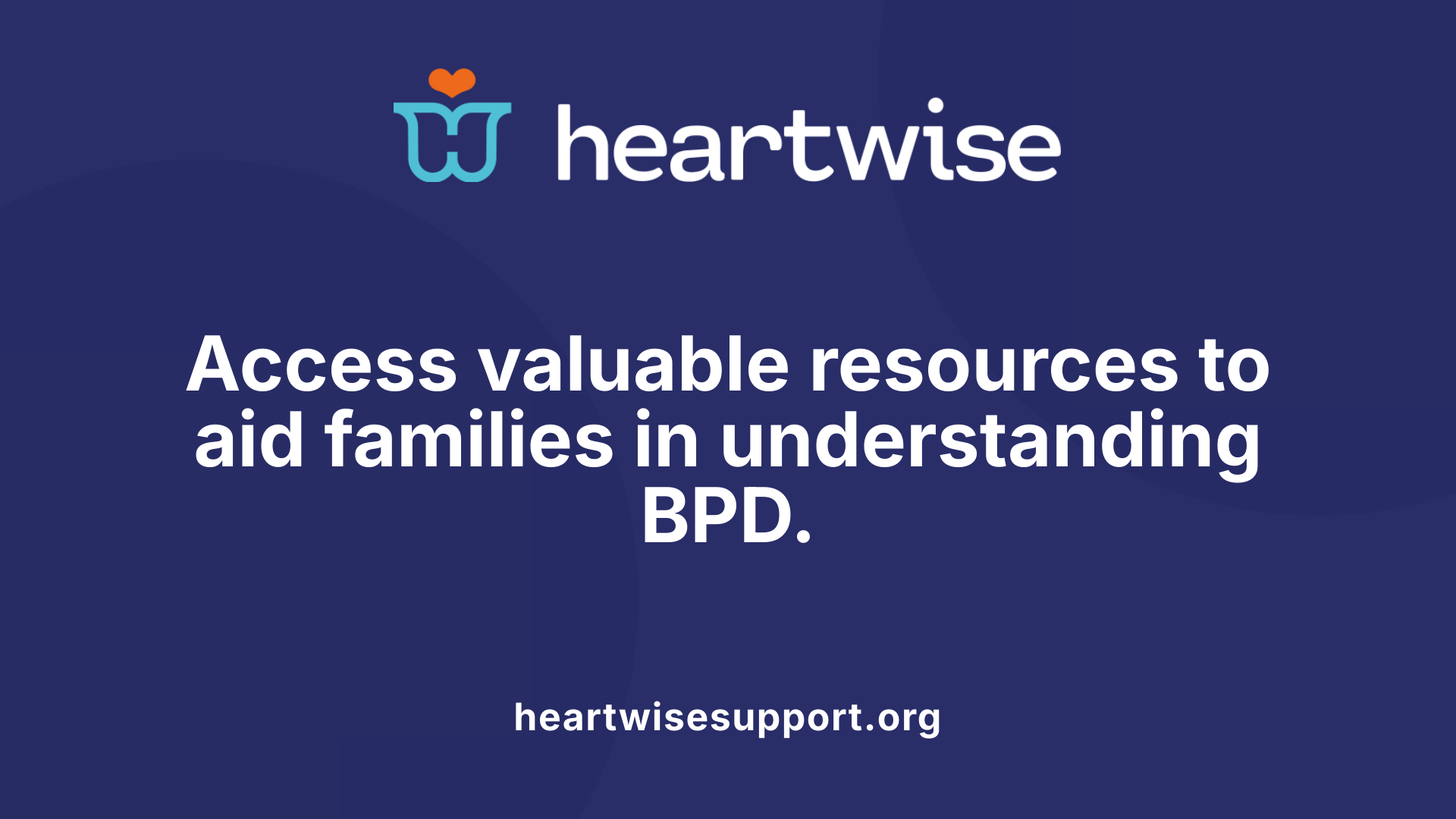
What educational resources are available for families to help their loved ones manage BPD?
Families navigating the complexities of Borderline Personality Disorder (BPD) can access a variety of educational resources designed to enhance understanding and support. One of the most notable programs is the Family Connections™ course, provided by the National Education Alliance for Borderline Personality Disorder (NEABPD). This free, evidence-based program includes online meetings focusing on education and skill training that empower families to interact more effectively with their loved ones.
In addition to the Family Connections course, NEABPD offers webinars and a Media Library containing audio and video resources. These materials provide families with insights into BPD's intricacies, equipping them with valuable coping strategies.
Another supportive platform is Emotions Matter, which emphasizes community support while providing programs that advocate for self-care and a deeper understanding of BPD. Families can benefit from the resources and guidance offered by established organizations like the National Alliance on Mental Illness (NAMI) and the National Institute of Mental Health (NIMH), which supply vital information to help manage the challenges associated with BPD effectively.
How do community support and skill-building play a role?
Support groups are an additional significant aspect of the educational landscape. Participation in these groups can alleviate feelings of isolation among family members, reinforcing that they are not alone in their journey. These groups also foster skill-building, enabling families to develop effective communication strategies for interacting compassionately with their loved ones experiencing BPD.
Collectively, these educational resources and community supports create a robust network that equips families with the necessary tools to better manage the challenges posed by BPD, enhancing the well-being of both the affected individual and their loved ones.
Fostering a Healing Home Environment
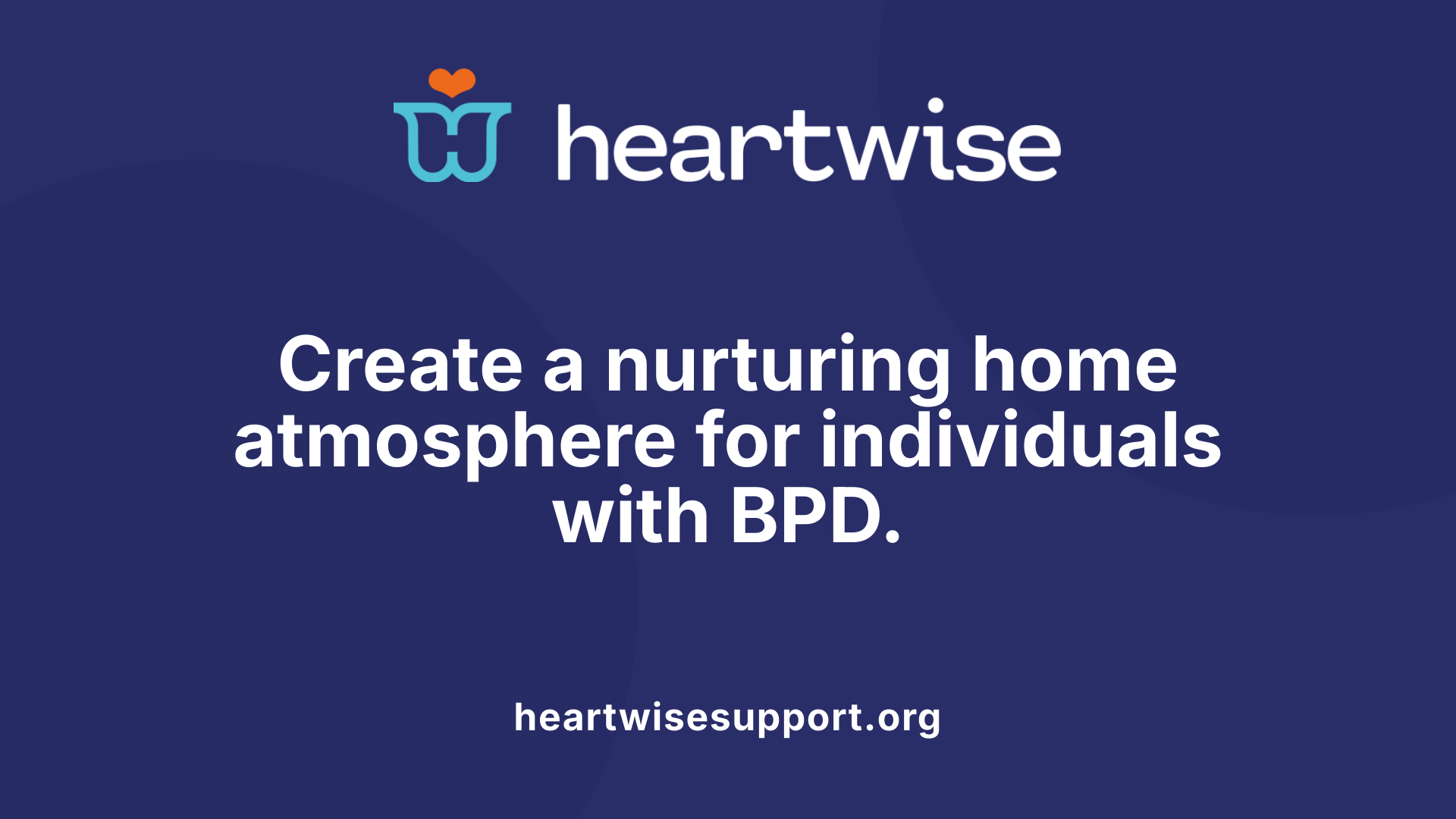
Creating Calmness and Stability
Creating a stable and calm family environment is essential for individuals with Borderline Personality Disorder (BPD). Such an atmosphere helps them better manage their emotional fluctuations. Family members should strive to remain calm during emotional upheavals to provide a sense of security. When family dynamics are characterized by understanding and patience, it empowers those with BPD to confront their feelings constructively.
Benefits of Routine
Maintaining a consistent routine can greatly benefit individuals with BPD. Providing predictability reduces anxiety and helps them navigate daily challenges more effectively. Enjoyable interactions that are unrelated to illness discussions can also foster positive family bonding. These moments of togetherness create a supportive space, allowing individuals to experience warmth and connection without the cloud of their struggles.
A nurturing environment significantly enhances the effectiveness of any treatment plan, making the role of family support indispensable.
Building a Supportive Foundation
The involvement of family in the management of Borderline Personality Disorder is critical not only for the well-being of the person diagnosed but also for the family unit as a whole. By fostering open communication, setting clear boundaries, and prioritizing self-care, families can provide essential support, significantly impacting their loved one's recovery journey. Educational programs and therapeutic interventions that include family members can bridge gaps in understanding and improve outcomes. Ultimately, a well-supported individual with BPD is more likely to thrive, highlighting the indispensable role of family support in managing this complex disorder.
References
- Borderline Personality Disorder Family Guidelines
- Parenting Role in the Development of Borderline Personality Disorder
- Helping Someone with Borderline Personality Disorder (BPD)
- The Family Connections Program
- Helping someone with borderline personality disorder - Mind
- The Importance of Family Interventions in Treatment for Adolescent ...
- Efficacy of “Family Connections”, a program for relatives of people ...











